19+ Log Sheet Examples to Download
As somebody who attended many conferences and trade shows in the past, you’ve probably signed over a dozen log sheets before. Because of how efficient they are in various industries, knowing how to create a good log sheet will come in handy. This article will show you how to do precisely that.
19+ Log Sheet Templates
Log Sheet Template
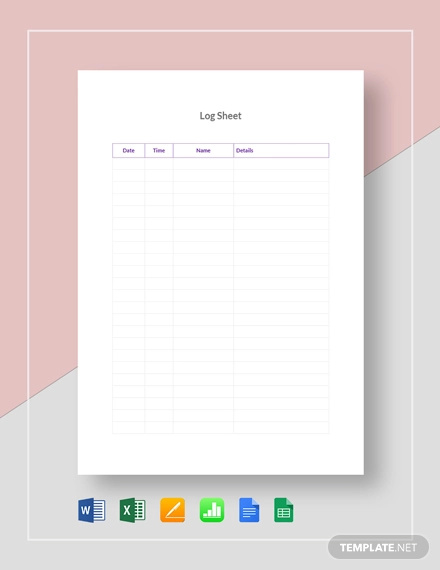
Call Log Sheet Template
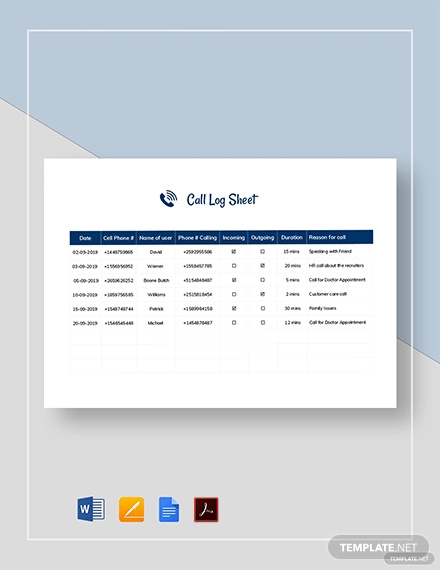
Maintenance Log sheet Template
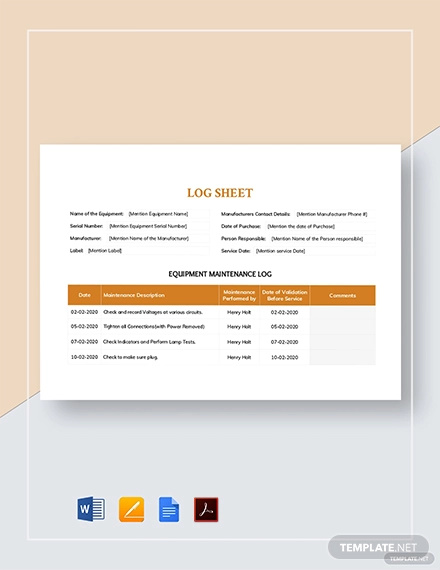
Daily Voids Log Sheet Template
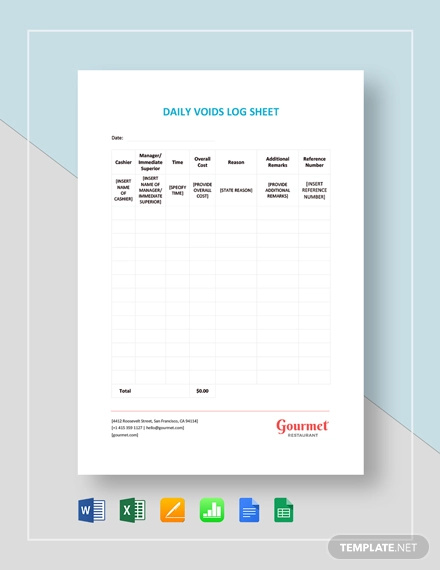
Restaurant Period Sales and Labor Log Sheet Template
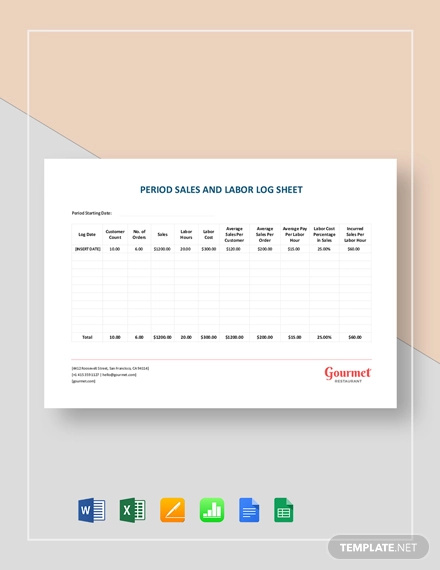
Customer Service Call Log
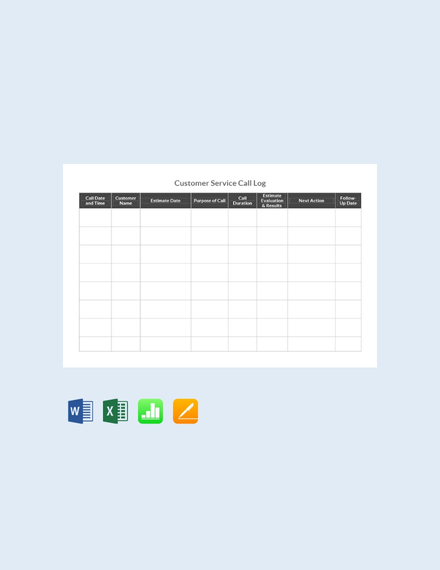
Daily Food Log
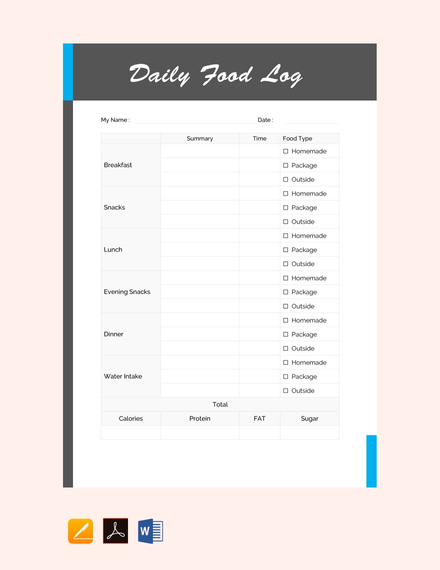
Independent Reading Log
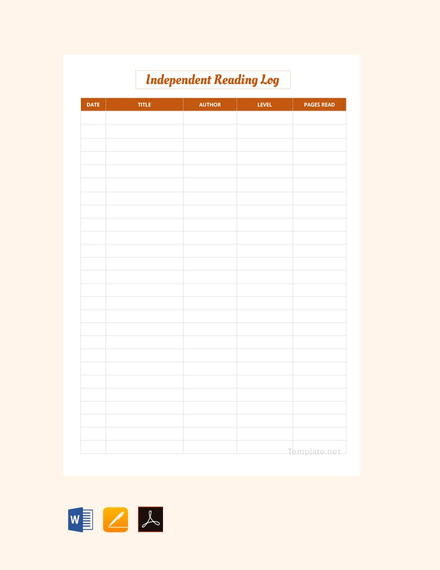
Machine Maintenance Log
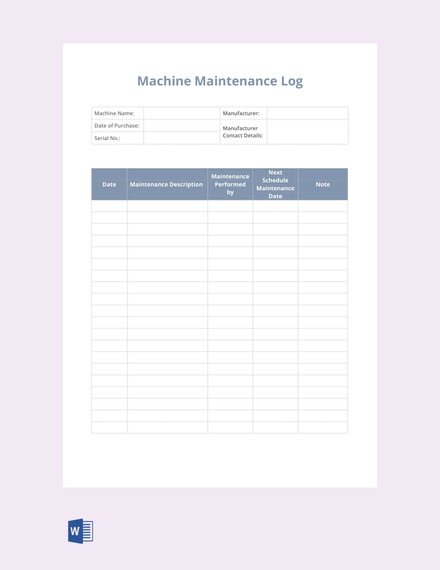
Mileage Log for Employee
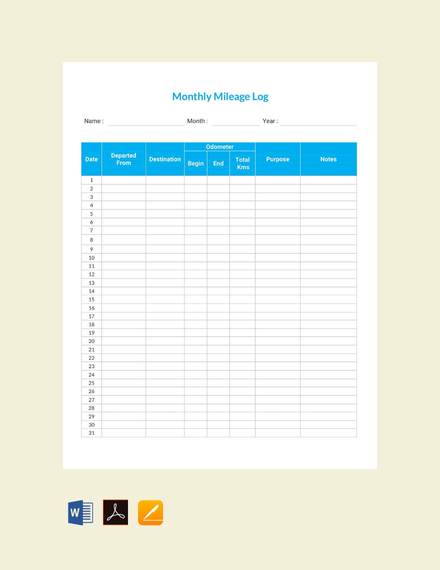
Monthly Food Log
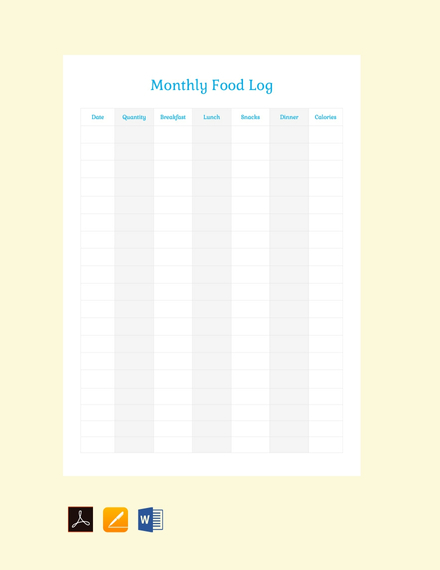
Outside Sales Call Log
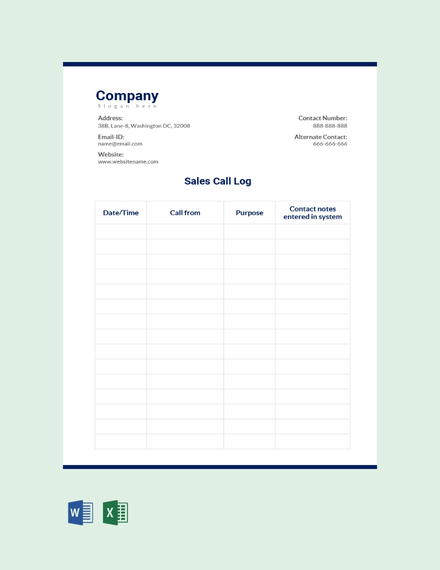
Reading Log Template for Middle School
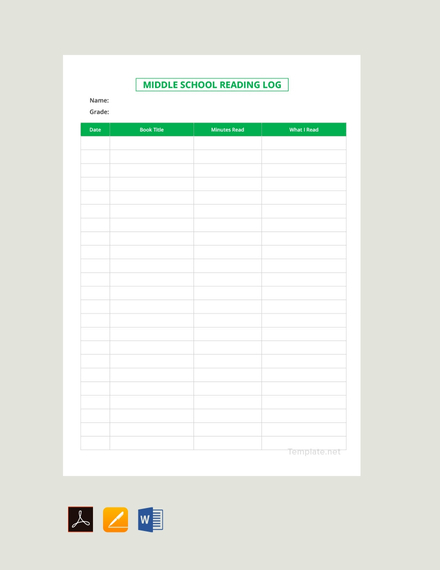
Weekly Food Log Template
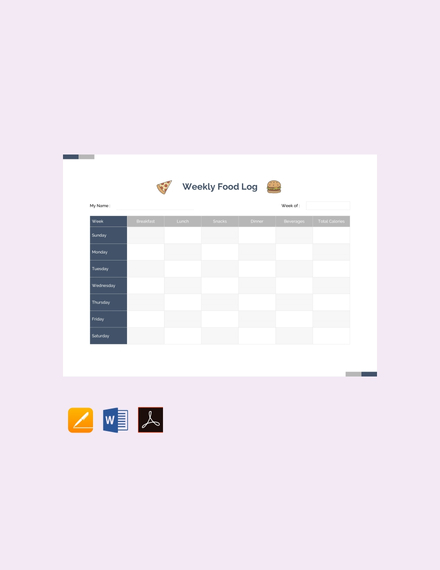
Simple Mileage Log
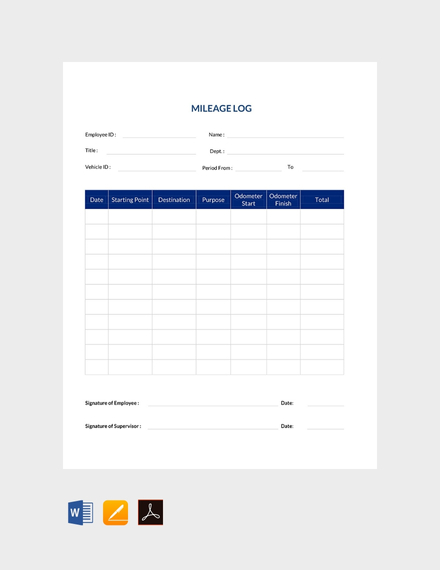
Daily Business Log Sheet
Employee Log Sheet
Food and Temperature Log Sheet
Hotline Call Log Sheet
Service Learning Time Log Sheet
What Is a Log Sheet?
A log sheet is a blank sheet used for collecting essential data for a specific purpose. Some examples include recording daily appointments or when visitors go in and out of place. Despite their differences in content or data, log sheets generally consist of a similar structure and format. Some of the most common forms of log sheets include a money log, a volunteer log, a work log, and an attendance sheet.
How To Create a Log Sheet
As mentioned in a Forbes article, a log sheet places all the information you need for easy access. Fortunately for you, log sheets are easy to create. The software MS Excel features more tools and options for a user-friendly experience. Follow the step-by-step guide below, and you’ll have your log sheet ready.
1. Think Of The Layout
Before you start creating your log sheet, plan the layout of it first. Think about what sort of table you are going to use and what font size you will be using. Planning out these details will give you an easy time when you are making your log sheet.
2. Specify Your Log Sheet
When creating your log sheet, you need to make its contents specific so that anyone would recognize what it is for. Avoid using vague and general words for it. For example, if you are making a log for construction materials, then make your log sheet specific with which is under equipment and which are chemicals.
3. Label Each Column
Put in labels on your log sheet so that it is easy for readers to navigate and understand it. For example, if you are reporting on the expenses of a business trip, you can label what products and services you are getting on the log sheet, so you don’t mix up the details.
4. Use Color Coding
Colors have a significant effect on communicating and labeling data. Take advantage of this effect to organize your log sheet. You can assign colors based on your chosen category so that people can navigate it with a glance.
FAQs
How can I make a log sheet?
If you don’t have the time and the patience to build a log sheet from scratch, you could always download a ready-made template online. You could also personalize the layer in a Word or Excel program to suit your requirements and preferences accordingly.
What makes a log sheet different from a checklist?
While both have a similar purpose and format, a log sheet needs to have its content written during its use. A checklist, on the other hand, already has items written on it before its use.
What is the purpose of a log sheet?
In any small business, it’s essential to keep a careful record of any activity or action that involves business resources. This includes anything from your employees’ time schedules to individual projects managed by the company. A log sheet lets you keep track of each business activity and continuously update data with new information whenever necessary.
With a little bit of work, you can improve the look and readability of your log sheet to serve its purpose. So if you ever find yourself in need of a log sheet, these templates and examples are sure to be of great help. If you need any more designs to guide you, feel free to check out similar ones like timesheets or to-do list templates.
19+ Log Sheet Examples to Download

As somebody who attended many conferences and trade shows in the past, you’ve probably signed over a dozen log sheets before. Because of how efficient they are in various industries, knowing how to create a good log sheet will come in handy. This article will show you how to do precisely that.
19+ Log Sheet Templates
Log Sheet Template

Template Details
Size: A4, US
Call Log Sheet Template

Template Details
Size: A4, US
Maintenance Log sheet Template

Template Details
Size: A4, US
Daily Voids Log Sheet Template

Template Details
Size: A4, US
Restaurant Period Sales and Labor Log Sheet Template

Template Details
Size: A4, US
Customer Service Call Log

Template Details
Size: A4 & US
Daily Food Log

Template Details
Size: A4 & US
Independent Reading Log

Template Details
Size: A4 & US
Machine Maintenance Log

Template Details
Size: A4 & US
Mileage Log for Employee

Template Details
Size: A4 & US
Monthly Food Log

Template Details
Size: A4 & US
Outside Sales Call Log

Template Details
Size: A4 & US
Reading Log Template for Middle School

Template Details
Size: A4 & US
Weekly Food Log Template

Template Details
Size: A4 & US
Simple Mileage Log

Template Details
Size: A4 & US
Daily Business Log Sheet
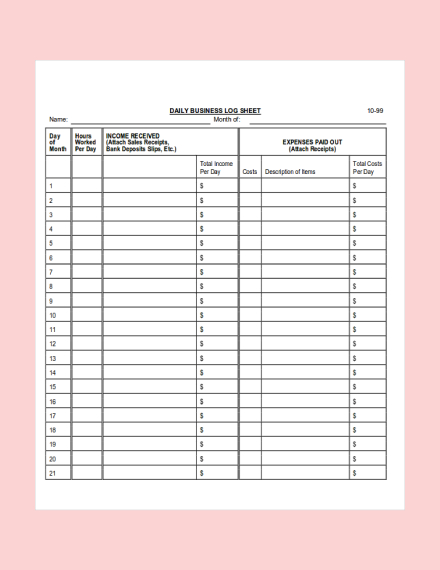
ks.gov
Details
File Format
PDF
Size: 64.3 KB
Employee Log Sheet
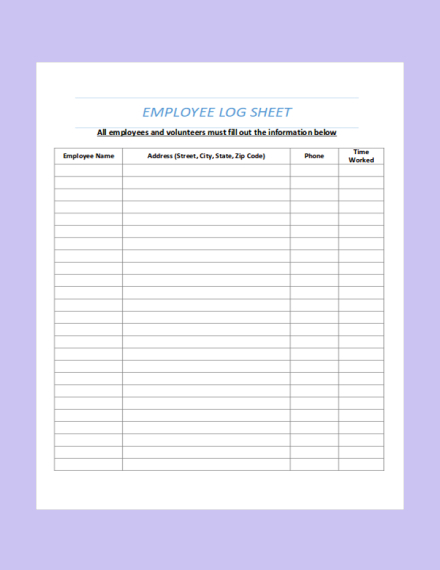
trumbull-ct.gov
Details
File Format
PDF
Size: 44.4 KB
Food and Temperature Log Sheet
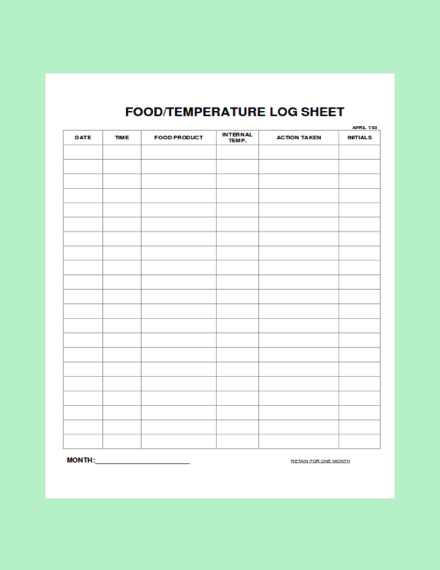
simcoemuskokahealth.org
Details
File Format
PDF
Size: 45.9 KB
Hotline Call Log Sheet
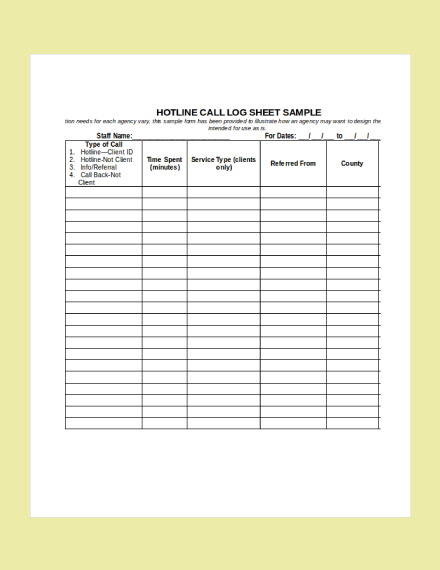
ilcadv.org
Details
File Format
PDF
Size: 38.0 KB
Service Learning Time Log Sheet
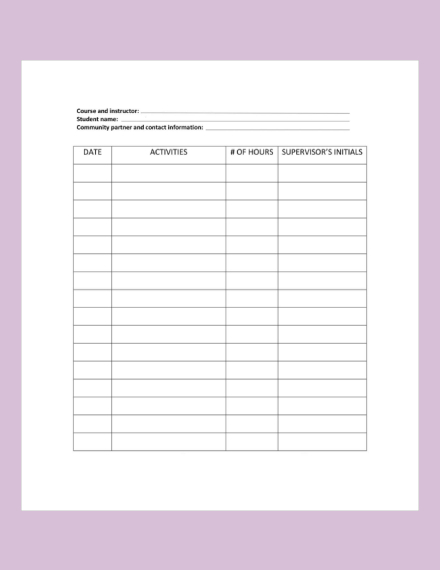
kilgore.edu
Details
File Format
PDF
Size: 30.2 KB
What Is a Log Sheet?
A log sheet is a blank sheet used for collecting essential data for a specific purpose. Some examples include recording daily appointments or when visitors go in and out of place. Despite their differences in content or data, log sheets generally consist of a similar structure and format. Some of the most common forms of log sheets include a money log, a volunteer log, a work log, and an attendance sheet.
How To Create a Log Sheet
As mentioned in a Forbes article, a log sheet places all the information you need for easy access. Fortunately for you, log sheets are easy to create. The software MS Excel features more tools and options for a user-friendly experience. Follow the step-by-step guide below, and you’ll have your log sheet ready.
1. Think Of The Layout
Before you start creating your log sheet, plan the layout of it first. Think about what sort of table you are going to use and what font size you will be using. Planning out these details will give you an easy time when you are making your log sheet.
2. Specify Your Log Sheet
When creating your log sheet, you need to make its contents specific so that anyone would recognize what it is for. Avoid using vague and general words for it. For example, if you are making a log for construction materials, then make your log sheet specific with which is under equipment and which are chemicals.
3. Label Each Column
Put in labels on your log sheet so that it is easy for readers to navigate and understand it. For example, if you are reporting on the expenses of a business trip, you can label what products and services you are getting on the log sheet, so you don’t mix up the details.
4. Use Color Coding
Colors have a significant effect on communicating and labeling data. Take advantage of this effect to organize your log sheet. You can assign colors based on your chosen category so that people can navigate it with a glance.
FAQs
How can I make a log sheet?
If you don’t have the time and the patience to build a log sheet from scratch, you could always download a ready-made template online. You could also personalize the layer in a Word or Excel program to suit your requirements and preferences accordingly.
What makes a log sheet different from a checklist?
While both have a similar purpose and format, a log sheet needs to have its content written during its use. A checklist, on the other hand, already has items written on it before its use.
What is the purpose of a log sheet?
In any small business, it’s essential to keep a careful record of any activity or action that involves business resources. This includes anything from your employees’ time schedules to individual projects managed by the company. A log sheet lets you keep track of each business activity and continuously update data with new information whenever necessary.
With a little bit of work, you can improve the look and readability of your log sheet to serve its purpose. So if you ever find yourself in need of a log sheet, these templates and examples are sure to be of great help. If you need any more designs to guide you, feel free to check out similar ones like timesheets or to-do list templates.

